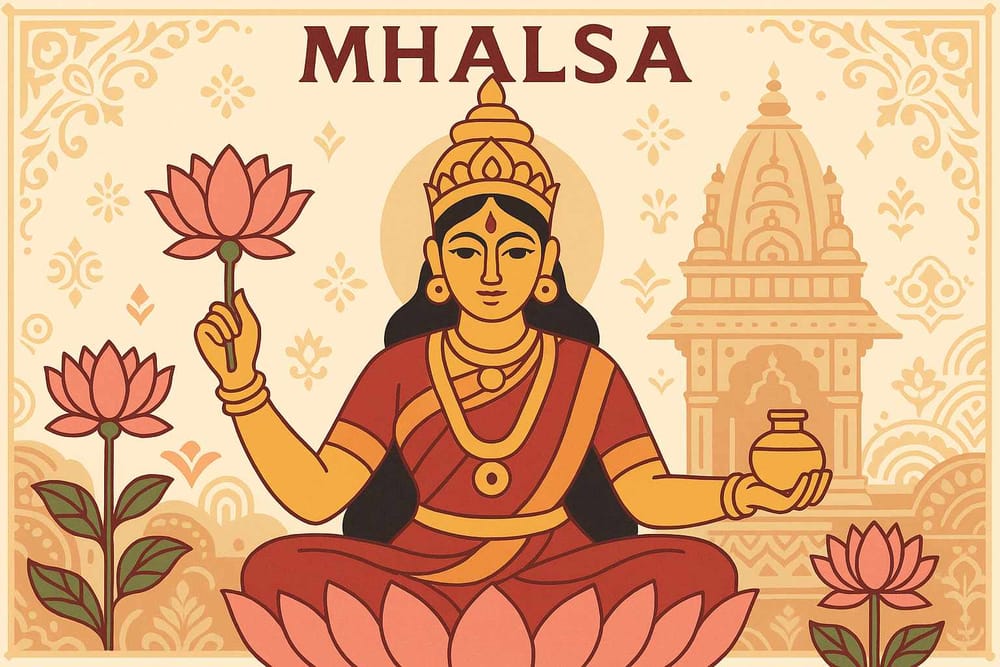
Mhalsa: Significance and Cultural Heritage Explored
In many Indian families, there’s a special, deeply personal bond with a Kuladevi—a goddess who is more than just a deity; she is a cherished family member, a divine mother watching over generations. For countless devotees across western and southern India, especially in Maharashtra and Goa, that beloved protector is Devi Mhalsa. She is not just a name in mythology but a living presence, a source of strength, and a symbol of unwavering devotion.
Her story is a beautiful blend of strength, grace, and nurturing love, making her an inspirational figure for all who seek blessings for marital harmony, prosperity, and spiritual fulfillment. Let's delve into the world of this revered goddess and understand why her legacy continues to shine so brightly.
The Divine Origins of Mhalsa Devi
To truly understand Mhalsa, we must journey back to her mythological origins. Who is she in the grand tapestry of our traditions? The stories tell us that Mhalsa is a form of Goddess Parvati, the divine consort of Lord Shiva. According to a beloved folk legend, she was born as the daughter of a wealthy merchant, destined to marry Lord Khandoba, who is himself an incarnation of Shiva. Their celestial wedding is said to have taken place on Pausha Pournima (the full moon day of the Pausha month), an event that is celebrated with great joy even today.
In some traditions, she is also associated with Mohini, the beautiful female avatar of Lord Vishnu. This connection highlights her captivating charm and divine power. As Mahalasa Narayani, her chief temple in Mardol, Goa, worships her as a form of Vishnu, showcasing the beautiful synthesis of Shaivite and Vaishnavite traditions in her worship.
Why is Mhalsa a Beacon of Cultural and Spiritual Significance?
Mhalsa's importance goes far beyond her mythological stories. She embodies the very essence of the divine feminine energy, making her integral to our cultural heritage. Here’s why she holds such a special place in the hearts of her devotees:
- A Symbol of Marital Bliss and Harmony: Mhalsa and Lord Khandoba’s relationship is seen as an ideal of marital harmony. Couples often seek her blessings for a strong, loving, and peaceful married life. Her presence in the home is believed to foster understanding and devotion between partners.
- The Bestower of Prosperity and Abundance: As a form of Parvati and Lakshmi, Mhalsa is deeply associated with prosperity and protection. Farmers in agricultural communities revere her, seeking her grace for a bountiful harvest. Families pray to her for wealth, well-being, and protection from harm. Her divine aura is believed to bring balance and abundance into the lives of her followers.
- A Nurturing Mother and Protector: Above all, Mhalsa is a nurturing mother. She is the Kuladevi who guards her family (devotees) with fierce love and compassion. People turn to her in times of trouble, finding solace and strength in their faith. She represents an ideal blend of gentle grace and formidable power.
Worship and Vibrant Celebrations: A Testament of Faith
The devotion for Mhalsa comes alive in vibrant and heartfelt worship practices. In the temples dedicated to her, certain key rituals form the heart of the worship. The air is thick with the fragrance of incense, the sounds of bells, and the chanting of devotional songs (bhajans).
One of the grandest festivals is Champa Shashti, a six-day celebration honouring both Mhalsa and Lord Khandoba. During this time, temples are adorned with auspicious offerings like turmeric, coconuts, and fragrant flowers. Preparing these offerings with a pure heart is a beautiful part of the ritual. At Bhaktilipi, we understand this sentiment and strive to provide authentic, high-quality items to help you in your devotional practices.
While her presence is felt everywhere by her devotees, her temples stand as magnificent beacons of faith. The Mhalsa Narayani Temple in Mardol, Goa, is a major pilgrimage site, drawing devotees from all over the country. The cultural importance of Mhalsa, particularly in Maharashtra, cannot be overstated. The main seat of her consort, Khandoba, is in Jejuri, which is another primary site of her worship. She is deeply woven into the region’s folklore, music, and daily spiritual life.
Mhalsa in Art and Culture
The reverence for Mhalsa is beautifully captured in various art forms. The intricate carvings in her temples are a testament to the devotion of artisans, reflecting a tradition of divine art much like the celebrated Mewar's rich heritage in arts and crafts. These sculptures and paintings depict her serene expression and divine attributes, serving as a constant reminder of her spiritual presence.
Her stories are passed down through generations via folk performances and music, keeping her legacy alive and vibrant. This celebration of the divine feminine for family well-being echoes in other beautiful traditions, such as the cultural significance of Gangaur Ghat celebrations, where Goddess Gauri (another form of Parvati) is worshipped with similar devotion.
The Enduring Legacy of Devi Mhalsa
In today's fast-paced world, the teachings and blessings of Devi Mhalsa remain as relevant as ever. She inspires us to cultivate devotion, unity, and resilience in our lives. Her worship has adapted gracefully to modern times, with online communities and resources making it easier for devotees to connect with their traditions, but the core emotion of ‘bhakti’ remains unchanged.
Mhalsa continues to be a source of divine inspiration and cultural pride. By honouring her, we embrace the timeless values that have been the bedrock of our culture for centuries, ensuring her sacred legacy continues to nurture souls for generations to come.
About Bhaktilipi
Bhaktilipi is dedicated to preserving and sharing timeless devotional literature and stories from across regions and languages. We carefully curate sacred texts, devotional poems, and inspiring stories, presenting them in original languages and translations for modern readers. Our platform connects tradition with convenience, offering authentic content that evokes bhakti while respecting cultural heritage.
Why Explore Mhalsa on Bhaktilipi?
Discover the significance of Mhalsa, a revered goddess in Indian culture, through informative articles on our platform. Learn about her role in devotional practices and her deep connection to spiritual traditions. By exploring such topics, you gain knowledge about India's rich heritage and devotion, helping you connect with timeless values in meaningful ways.
Stay Updated
Subscribe to our newsletter for occasional updates on new posts, features, and reflections. Follow us on social media or YouTube for more engaging content:
Join us in celebrating devotion and tradition with Bhaktilipi!
A passionate group of people dedicated to preserving India's knowledge of Dharma, Karma, and Bhakti for ourselves and the world 🙏.
